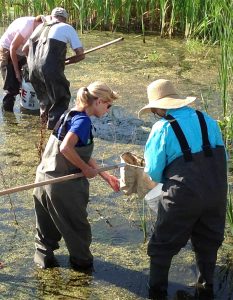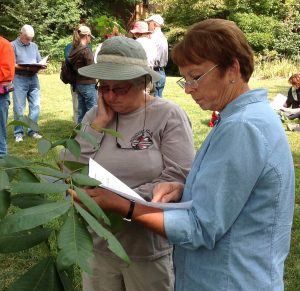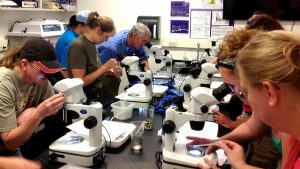Master Naturalists offer extensive knowledge of the outdoor world
By Elise Zwicky For Chronicle Media — May 6, 2016
Participants in the University of Illinois Extension’s Master Naturalist program training work on forest ecology at the Starhill Forest Arboretum in Petersburg. The program is offere in Tazewell, Fulton and Peoria counties. (Photo courtesy of the University of Illinois Extension)
As a prairie aficionado and self-proclaimed “rock and fossil hound,” Jen McDaniel of Peoria jumped at the chance to become a master of nature.
The former veterinary technician is one of about 65 people who have graduated from the University of Illinois Extension’s Master Naturalist program since it began in the Fulton-Mason-Peoria-Tazewell unit in 2012.
Other nature lovers and those who value natural resources have a chance to become master naturalists as well through a two-week training program in June. Informational meetings about the program take place May 9 in Tazewell County, May 10 in Fulton County and May 11 in Peoria County.
Cost of the training is $250, which goes toward a learning manual, handouts and some field supplies, including a covered clipboard, sunscreen and insect repellent.
“One thing that was appealing to me about the MN program is that unlike the Master Gardener program, there is no requirement to have a college degree,” said McDaniel, who took the training in 2013.
“To me, this follows the centuries-old tradition of naturalists who often had little formal training but passionately delved into the world around them,” she added. “Obviously, we benefit by learning from those with experience and education. Yet there is so much lay knowledge to be had outside a formal or academic setting. And in turn, master naturalists pass on not only our knowledge, but also our passion and love for nature.”
While her interest lies primarily in prairies and rocks, McDaniel said there’s a network of master naturalists she can turn to for information about woodland plants, certain ecosystems, educational styles and other topics.
Extension program coordinator Christine Belless, who coordinates the master naturalist training locally, said the program attracts people from all walks of life.
“You have to be at least 18, but we’ve had some in their mid 20s and some in their early 80s come through training,” Belless said. “What I find is these folks are just lifelong learners who are passionate about the earth.”

Trainees in the University of Illinois Extension’s Master Naturalist program collect specimens to take back to a field station at the Nature Conservatory Emiquon in Lewistown. The Extension is offering an intense 10-day training this summer to become a master naturalist. (Photo courtesy of the University of Illinois Extension)
Educators can receive 60 hours of professional development through the training.
The Master Naturalist program began in 1997 in Texas and was first introduced in Illinois in 2004 in the Quad Cities area, Belless said. Nineteen people participated in the first local training in 2012. Last year was the first year a summer training course was offered. After this year, the summer training will alternate every other year with fall training.
“Right now we have 15 enrolled for the summer, and we have to limit the class to about 20,” Belless said.
The training includes subjects such as geology, anthropology, archeology, forest ecology, astronomy and ornithology.
During 10 days of classes, which meet from 9 a.m. to 4 p.m. most days, participants will visit sites in all four counties, including Chautauqua Wildlife Refuge in Havana, the Emiquon Nature Conservancy in Lewistown, Wildlife Prairie Park, Jubilee State Park and the Jake Wolfe Memorial Fish Hatchery in Topeka.
Belless said the program’s mission is to connect people with nature and to help them become engage environmental stewards.
“We do lots of hands-on training and field work,” she said. At the Emiquon Nature Conservancy, for example, participants will don hip waders to take specimens in shallow water and also go out in a boat to collect water samples.
“The training is fairly intense, but it’s a good time,” Belless added. “We try to make the outdoors the biggest part of our classroom, so we’re not sitting inside watching PowerPoint.”
The instructors are Extension educators and other local and regional experts, who volunteer their time to the program.
After participants graduate from the training, they must complete 60 volunteer hours within two years before becoming active master naturalists. Each subsequent year, they’re required to complete 30 volunteer hours and 10 continuing education hours to remain active.

Trainees in the University of Illinois Extension’s Master Naturalist program use microscopes to examine and identify specimens they collected at the Nature Conservatory Emiquon in Lewistown. (Photo courtesy of the University of Illinois Extension)
While the Extension’s Master Gardner program always has an educational aspect, Belless said that is not a requirement in the Master Naturalist program. Some choose to share their knowledge through docent work at Wildlife Prairie Park or Forest Park Nature Center, while others apply their knowledge by volunteering at some of the partnership sites.
Since 2012 master naturalists in the Extension’s Fulton-Mason-Peoria-Tazewell unit have logged 13,786 volunteer hours, Belless said.
McDaniel started a group for kids age 12 to 18 and their families called the Prairie Home Nature & Science Outdoor Classroom.
“We meet twice a month and visit natural sites, learning about the geology, ecology and special features in the area,” she said. “We’ve collected and analyzed macro invertebrates from the stream at Camp Wokanda, studied geologic cyclotems at Independence Park in Marquette Heights and dissected biology specimens over the winter. I wanted to honor a passive approach to learning in nature by being in nature, and then add a light but pertinent curriculum to each visit.”
McDaniel also helps out at Wildlife Prairie Park when needed and pitches in at master naturalist events.
To sign up for the master naturalist training, visit the website http://web.extension.illinois.edu/fmpt/mn/ or call Jason Haupt or Christine Belless at (309) 547-3711.
The informational meetings will take place at 5 p.m. each day on May 9 at 1505 Valle Vista in Pekin; May 10 at 15411 N. IL 100 Hwy in Lewistown; and May 11 at 4810 N. Sheridan in Peoria.
— Master Naturalists offer extensive knowledge of the outdoor world —



